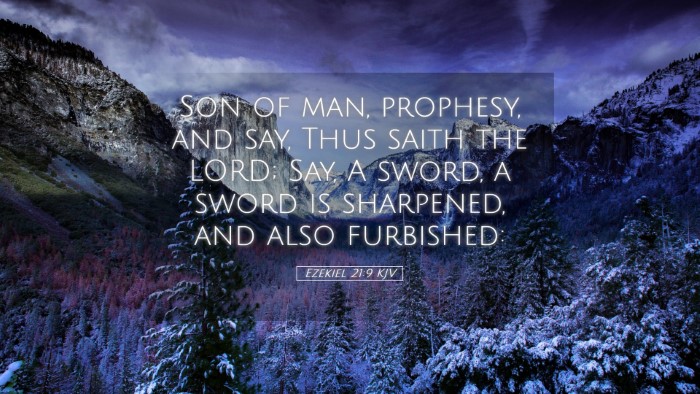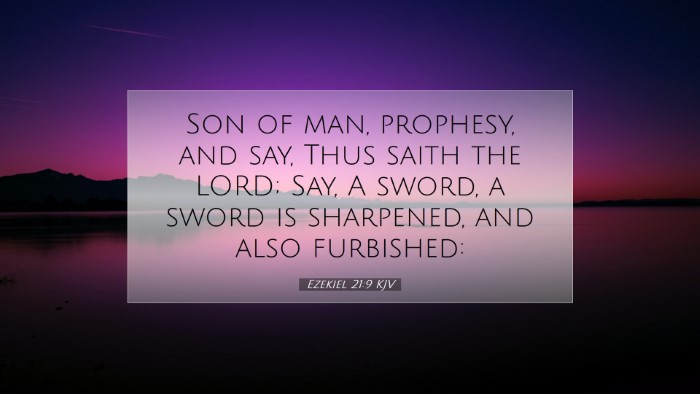Ezekiel 21:9 Commentary
Verse Text: "Son of man, prophesy and say, Thus saith the Lord; Say, A sword, a sword is sharpened, and also furbished:" (Ezekiel 21:9)
Introduction
The book of Ezekiel, known for its vivid imagery and profound symbolism, contains a plethora of prophetic declarations concerning the fate of Israel and the surrounding nations. Ezekiel 21 is a pivotal chapter that emphasizes the themes of judgment, divine sovereignty, and the impending calamity facing Jerusalem. The verse in focus, Ezekiel 21:9, serves as a crucial proclamation of God's judgment, illustrating the serious consequences of national sin and disobedience.
Exegesis and Meaning
In Ezekiel 21:9, the prophet is commanded to announce the sharpening of a sword, emblematic of warfare and divine judgment. This motif is prevalent throughout the prophetic literature, where instruments of destruction are often revealed as tools in the hand of God to execute His will.
Divine Command and Prophetic Role
Matthew Henry, in his commentary, notes the weight of the prophetic office and the urgency of Ezekiel's message. He emphasizes that the phrase "prophesy and say" underscores the immediate command from God to deliver this serious message without delay. The use of "son of man" not only identifies Ezekiel as a human messenger but serves to highlight the contrast between divine authority and human frailty.
Symbolism of the Sword
From a symbolic standpoint, the sword represents judgment and division. Albert Barnes explains that the sword "sharpened" signifies preparation for battle, indicating that God's judgment is imminent and not arbitrary. The act of sharpening also suggests the precision with which God executes His plans, ensuring that His justice shall not be evaded or impeded.
Furbished for Purpose
The term "furbished" denotes the process of polishing, which may indicate that the sword is ready for use in swift and decisive judgment. Adam Clarke adds that this readiness reflects the intense and immediate execution of divine wrath against Jerusalem, reinforcing the message of unavoidable consequence resulting from unrepentant sin.
The Context of Judgment
Ezekiel 21 must be understood within the broader narrative of Israel's disobedience and the covenantal curses outlined in the Torah. The sharpening of the sword serves not only as a warning but also as an affirmation of God's sovereignty over the unfolding events. As noted by Matthew Henry, it illustrates God's control over nations and their fates, depicting Him as the ultimate ruler who utilizes the kingdoms of this world to fulfill His divine purposes.
Applications for Today
For pastors and theologians, Ezekiel 21:9 serves as a potent reminder of the seriousness of sin and the need for genuine repentance. The image of a sharpened sword evokes a theology of judgment that must not be neglected in contemporary discourse. Albert Barnes articulates that the warnings embedded in this prophecy transcend the historical context, offering timeless principles regarding the nature of God as both merciful and just.
The Call to Repentance
As modern believers, we are called to consider the implications of rebellion against God. The prophetic emphasis on the sword serves as a grave reminder of the consequences of sin, not merely for nations but for individuals as well. Adam Clarke points out that the foresight of impending disaster should encourage both personal and communal reflection on one’s spiritual state.
God’s Sovereignty in Judgment
The narrative invites us to recognize God's sovereignty throughout history—declaring that even when judgment feels harsh, it serves to highlight His holiness. God's willingness to enact judgment is a testament to His faithfulness to uphold His covenant promises, as He will not allow sin to go unpunished.
Conclusion
Ezekiel 21:9 stands as a stark reminder of the reality of divine judgment and the need for vigilance in the life of faith. The imagery of the sword—a tool of both destruction and protection, depending on its use—challenges readers to reflect on their own relationship with God. The verse encourages deep contemplation on God's holiness and underscores the necessity of living in a manner that honors Him.
In the light of Ezekiel's prophetic proclamation, may pastors, students, and scholars alike be compelled to disseminate the undiluted message of truth to a world in desperate need of divine intervention and reconciliation.


